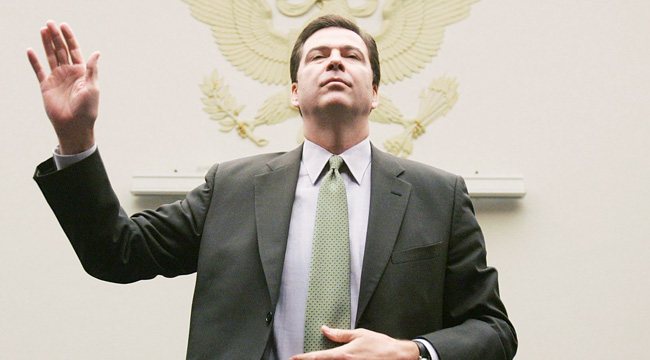
James Comey agreed to testify before the Senate Intelligence Committee next week, something that the former FBI director terminated by Donald Trump is reportedly “eager” to do. Aside from Sean Spicer’s refusal to answer anymore questions about Comey and the ongoing Russia probe, however, the White House is also exploring the possibility of blocking Comey’s testimony, which is scheduled for the morning of Thursday, June 8th. As president, Trump could technically invoke executive privilege to prevent Comey from testifying, but legal experts disagree as to whether or not it’s applicable in this situation.
Executive privilege stems from the Supreme Court’s opinion in the 1974 case US vs. Nixon that, per CNN, recognized the “President and those who assist him must be free to explore alternatives in the process of shaping policies and making decisions and to do so in a way many would be unwilling to express except privately.” Despite this expressed protection, however, such privilege isn’t “absolute” — especially certain facts about Comey’s upcoming testimony break with precedence. Even more so since the U.S. Court of Appeals’ D.C. Circuit determined “privilege disappears altogether when there is any reason to believe government misconduct occurred.”
Robert Mueller’s expanding Russia probe is trying to determine whether or not this is the case but won’t finish for quite some time. Until then, an attempt by the Trump White House to block Comey’s testimony may encounter certain legal challenges based on pertinent facts. For example, Comey is no longer a federal employee since Trump promptly fired him in early May. What’s more, the New York Times notes the president himself has “publicly disclosed” certain aspects of his and Comey’s otherwise private conversations on Twitter and in television interviews. As a result, he may have inadvertently waived his right to invoke executive privilege.
Yet the Times also suggests the Justice Department could request a federal judge issue a restraining order against Comey, thereby barring him from testifying. Much like the problems for executive privilege created by Trump’s possibly waiving his office’s exclusive right, however, the president’s repeated public mentions of the matter may also make issuing a restraining order — let alone requesting one — legally difficult, if not impossible.
(Via CNN and New York Times)
